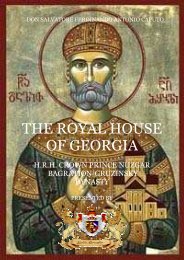here - Nobility Associations
here - Nobility Associations
here - Nobility Associations
You also want an ePaper? Increase the reach of your titles
YUMPU automatically turns print PDFs into web optimized ePapers that Google loves.
Charles the Zoppo (Lame) was made prisoner by the Ghibellines), the kingdom in<br />
turmoil and the opponents more than ever keen to end the Angevin domain.<br />
Corrado of Antioch helped with the money that was sent by his cousin the Queen<br />
Constance of Sicily, took a bitter fight. Taking advantage the disturbance arose in<br />
the Regno of the death of Charles I of Anjou in January 1285, the Corrado occupied<br />
lands and castles in Abruzzo, including, as it deems justified in the Ridola (p. 253<br />
and n. 2), and also the ancestral county of Alba.<br />
The Antioch family represented the most formidable adversaries for the papacy<br />
who suffered their threat especially near the eastern borders of the Patrimony of St.<br />
Peter, the Swabian family controlled through the Valley Sublacenze and<br />
Giovenzana.<br />
Corrado of Antioch was a worthy heir of the deeds of his father; in Anticoli he<br />
founded a dynasty that for two centuries the Antioch formed a thorn in the side of<br />
the Church: they, the lords of Saracinesco and Sambuci until the mid-sixteenth<br />
century, never denied the ideal Ghibellines.<br />
Certainly in the last years of the century, the death on his relentless enemy Charles<br />
I of Anjou, probably due to the intervention of Pope Boniface VIII, Corrado<br />
reconciled with the House of Anjou and the Church. Another clue to confirming the<br />
peace with the Holy See is the marriage of one of the daughters of Corrado with<br />
Ottaviano da Brunforte, who was appointed in 1297 by Pope Boniface VIII papal<br />
vicar in Todi (F. Gregorius, op. cit., III, page 118 n. 50; P. Ridola, op. cit., page 255<br />
n.1)<br />
The Vespers and Europe<br />
The outbreak of the Vespers at Palermo marked an important decisive moment in<br />
history of Sicily.<br />
On the death of the emperor Frederick the Popes´ main object was to prevent the<br />
revitalization of Hohenstaufen power. The Papacy seemed to have triumphed over<br />
its chief rival for the ecumenical sovereignty of Europe. But the Papacy could not<br />
become the sovereign of Christendom without lay help; it needed the sanction of<br />
physical force to ensure that its decrees were obeyed and the taxes and tithes that it<br />
demanded were paid. The prototypical solution would have been an acquiescent<br />
Emperor whose power would be at the Pope´s command.<br />
T<strong>here</strong> was never a more fervent and conscientious son of the Church than King<br />
Louis IX of France. In Louis IX of France were united the qualities of a just and<br />
upright sovereign, a fearless warrior, and a saint. King Louis IX was the only<br />
French king ever to be made a saint. He was a very popular monarch, noted for his<br />
kindness and fair dealings with his people. Louis led the Seventh Crusade in the<br />
The Hohenstaufen Dynasty - Page 163 of 200



